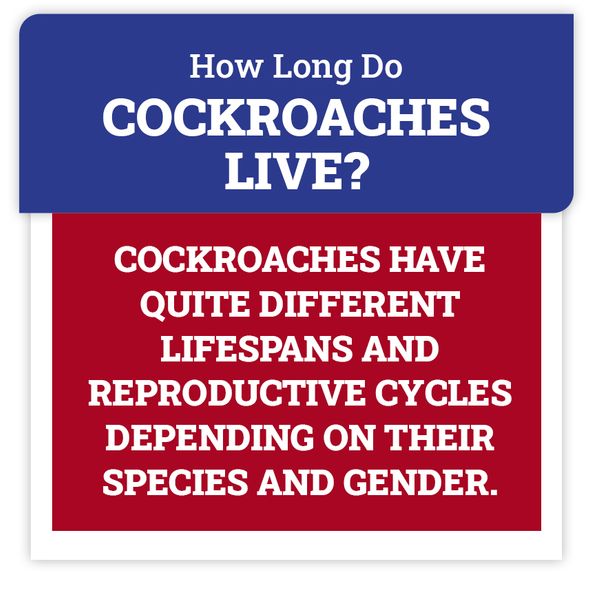
Cockroaches
Cockroaches can be a major concern in homes and businesses. Besides being unsightly and creating an unclean feeling, cockroaches carry several diseases and can cause real sanitation problems, especially when it comes to food safety and air quality, in New Jersey. Exterminators explain there are a few common species that thrive in the summer months and seek shelter in the colder winter months. Cockroaches live in tight spaces and tend to hide, so if you see one, that may be a small glimpse of a larger infestation living inside the walls of your home or business.
To protect your home or business from cockroaches, you need to learn about the behavior of this pest, take steps for prevention, and find a pest control expert should an infestation occur.
What Is A Cockroach?
Cockroaches are possibly the most ancient insect on Earth, dating back around 320 million years. Cockroaches are a generalized insect without special adaptations like sucking mouthparts (such as aphids or cicada). There are about 4,600 species of cockroaches, about 30 of which are known to live around humans. Exterminators explain only four or five of those are the well-known pests most of us have encountered. The most common in Hudson County, Bergen County, Essex County and Union County are the American cockroach, German cockroach, Asian cockroach, brown-banded cockroach, and the Oriental cockroach.
How Do I Identify A Cockroach?
Exterminators advise there are several species of cockroaches that you may come across. The most common species found in New Jersey are the American and German cockroaches. Tapout Pest’s certified entomologist, Craig, explains cockroaches are both oval-shaped, reddish-brown, and have thin, spiny legs. American cockroaches are about twice as big and can be up to about an inch and a half long.
The other two species commonly found in or around homes and businesses in New Jersey are the Brown-Banded cockroach and the Oriental cockroach. The Oriental cockroach hails from Africa, not Asia, and is also known as the water bug. They are typically a bit smaller, dark, and smooth, and tend to be in damp areas.
Brown-banded cockroaches have light brown bands across their wings and abdomen. They prefer the warmer areas of your home or business.
An Asian Cockroach looks very similar to the German cockroach, but tend to live outdoors more often, and are more common in the south than in the New Jersey, Pest control technicians say, if you see a cockroach in this area that looks like a German cockroach, that’s probably what it is.

How Do I Prevent Cockroaches?
Exterminators explain sanitation is the number one way to prevent a cockroach infestation. Keep your home clean and free of debris, especially food. Pay special attention to the kitchen. Don’t leave dirty dishes around overnight, and keep food in sealed containers. Pest control experts at Tapout Pest recommend cleaning up spills right away and try not to leave pet food lying around at night. Cockroaches can be especially interested in alcohol, particularly beer, so make sure not to leave cans open on the counter and properly dispose of cans in the trash.
Pest control experts suggest addressing any areas where cockroaches could enter your home or business from the outside. Seal cracks such as those around windows or pipes, repair holes in doors and windows and keep your home or business free of clutter like newspapers, magazines, and dirty clothes, to prevent cockroach problems.
Finally, make a habit of checking backpacks and other items you bring into the house, especially if they have been outside on the ground. Consider also checking any deliveries, especially food deliveries, as roaches can be introduced to a home or business this way.
How Did I Get Cockroaches?
Exterminators at Tapout Pest state cockroaches can crawl into your home or business through cracks in walls, under doors, or through pipes like outdoor spigots. They can hitch a ride in on backpacks, purses, or other items (especially food), and cockroaches can travel through walls or pipes from adjacent apartments if you live in a multi-unit complex. Cockroaches are exceptionally good at finding food, so if you have left food out, not cleaned up recently, or have open trash cans, you are more likely to attract these pests.
Cockroaches will also seek the warmth and shelter of your home or business during the colder months, and you may see more of them during this time.
Pest control experts remind us it’s reasonable to expect to see at least a few cockroaches around from time to time, so don’t beat yourself up if you see one, but do try to keep your New Jersey ware home or business clean and free of food that may attract them and encourage them to stick around.
What Are The Effects Of A Cockroach Problem In And Around My Home or Business?
Exterminators understand cockroaches can cause several problems if left unchecked. Cockroaches don’t bite and they don’t tend to eat your home like termites or carpenter ants, but they can pose a serious health risk.
Cockroaches can be a vector for diseases such as salmonella, e. coli, dysentery, or staph infections, among others, by contaminating food or food preparation surfaces with their droppings or simply by mechanical transfer (a.k.a. walking on things and spreading viruses and bacteria). Cockroaches have also been known to exacerbate asthma and allergies, as their skin and droppings can be breathed in.

How Long Do Cockroaches Live?
Cockroaches have quite different lifespans and reproductive cycles depending on their species and gender. Male adult American cockroaches can live up to about a year, whereas females can live up to 700 days. Before that, though, it takes around 600 days for this species to fully mature.
German cockroaches, on the other hand, live about 200 days. Oriental cockroaches are slightly shorter-lived with males living about 160 days and females living around 180 days. Brown-banded cockroaches live an average of 206 days and Asian cockroaches are very short-lived. Males live around 49 days and females live about 104 days.
All these species reproduce proficiently. Cockroaches can produce anywhere from 100 to 250 offspring during a female’s lifetime, so they can get out of hand quickly.



